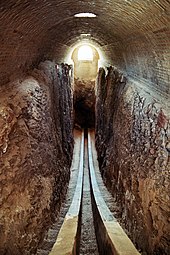सटीक विज्ञान

सटीक विज्ञान को कभी-कभी सटीक गणितीय विज्ञान कहा जाता है[1] वे विज्ञान हैं "जो अपने परिणामों में पूर्ण सटीकता को स्वीकार करते हैं"; विशेष रूप से गणितीय विज्ञान।[2] सटीक विज्ञान के उदाहरण हैं गणित, प्रकाशिकी, खगोल विज्ञान, और भौतिकी, जो डेसकार्टेस, लीबनिज़, और कांत से लेकर कई दार्शनिक हैं। तार्किक प्रत्यक्षवादी ने तर्कसंगत और वस्तुपरक ज्ञान के प्रतिमान के रूप में लिया।.[3] इन विज्ञानों का अभ्यास प्राचीन काल से कई संस्कृतियों में किया जाता रहा है[4][5].[6][7]गणित के साथ उनके संबंधों को देखते हुए, सटीक विज्ञान की विशेषता सटीक मात्रात्मक अभिव्यक्ति, सटीक भविष्यवाणियां और/या कठोर परीक्षण के तरीके परिकल्पना मात्रात्मक भविष्यवाणी शामिल है एस और माप एस।
मात्रात्मक सटीक विज्ञान और उन विज्ञानों के बीच अंतर जो चीजों के कारणों से निपटते हैं अरस्तू, जिन्होंने गणित को प्राकृतिक दर्शन से अलग किया और सटीक विज्ञान को "गणित की शाखाओं के अधिक प्राकृतिक" माना।"[8] थॉमस एक्विनास ने इस अंतर को तब नियोजित किया जब उन्होंने बताया कि खगोल विज्ञान गणितीय तर्क द्वारा पृथ्वी का गोलाकार आकार की व्याख्या करता है जबकि भौतिकी इसे भौतिक कारण द्वारा समझाती है।[9] 17वीं शताब्दी के वैज्ञानिक क्रांति तक यह भेद व्यापक रूप से स्वीकार किया गया था, लेकिन सार्वभौमिक रूप से नहीं।[10] एडवर्ड ग्रांट ने प्रस्तावित किया है कि नए विज्ञानों के लिए एक मौलिक परिवर्तन केप्लर, न्यूटन, और अन्य द्वारा सटीक विज्ञान और भौतिकी का एकीकरण था, जिसके परिणामस्वरूप मात्रात्मक प्राकृतिक घटनाओं के भौतिक कारणों की जांच।[11]
संदर्भ[संपादित करें]
- ↑ Grant, Edward (2007), A History of Natural Philosophy: From the Ancient World to the Nineteenth Century, Cambridge: Cambridge University Press, पृ॰ 43, आई॰ऍस॰बी॰ऍन॰ 9781139461092
- ↑ "Exact, adj.1", Oxford English Dictionary, Online version (2nd संस्करण), Oxford: Oxford University Press, June 2016
- ↑ Friedman, Michael (1992), "Philosophy and the Exact Sciences: Logical Positivism as a Case Study", प्रकाशित Earman, John (संपा॰), Inference, Explanation, and Other Frustrations: Essays in the Philosophy of Science, Pittsburgh series in philosophy and history of science, 14, Berkeley and Los Angeles: University of California Press, पृ॰ 84, आई॰ऍस॰बी॰ऍन॰ 9780520075771
- ↑ Neugebauer, Otto (1962), The Exact Sciences in Antiquity, The Science Library (2nd, reprint संस्करण), New York: Harper & Bros.
- ↑ Sarkar, Benoy Kumar (1918), Hindu Achievements in Exact Science: A Study in the History of Scientific Development, London / New York: Longmans, Green and Company
- ↑ Harman, Peter M.; Shapiro, Alan E. (2002), The Investigation of Difficult Things: Essays on Newton and the History of the Exact Sciences in Honour of D. T. Whiteside, Cambridge: Cambridge University Press, आई॰ऍस॰बी॰ऍन॰ 9780521892667
- ↑ Pyenson, Lewis (1993), "Cultural Imperialism and Exact Sciences Revisited", Isis: 103–108, JSTOR 235556, डीओआइ:10.1086/356376,
[M]any of the exact sciences… between Claudius Ptolemy and Tycho Brahe were in a common register, whether studied in the diverse parts of the Islamic world, in India, in Christian Europe, in China, or apparently in Mesoamerica.
- ↑ Grant, Edward (2007), A History of Natural Philosophy: From the Ancient World to the Nineteenth Century, Cambridge: Cambridge University Press, पपृ॰ 42–43, आई॰ऍस॰बी॰ऍन॰ 9781139461092
- ↑ Aquinas, Thomas, Summa Theologica, Part I, Q. 1, Art. 1, Reply 2, अभिगमन तिथि 3 September 2016,
For the astronomer and the physicist both may prove the same conclusion: that the earth, for instance, is round: the astronomer by means of mathematics (i.e. abstracting from matter), but the physicist by means of matter itself.
- ↑ Grant, Edward (2007), A History of Natural Philosophy: From the Ancient World to the Nineteenth Century, Cambridge: Cambridge University Press, पपृ॰ 303–305, आई॰ऍस॰बी॰ऍन॰ 9781139461092
- ↑ Grant, Edward (2007), A History of Natural Philosophy: From the Ancient World to the Nineteenth Century, Cambridge: Cambridge University Press, पपृ॰ 303, 312–313, आई॰ऍस॰बी॰ऍन॰ 9781139461092
